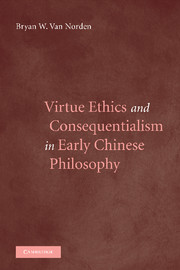2 - Kongzi and Ruism
Published online by Cambridge University Press: 25 July 2009
Summary
When it comes to reading the Analects, there are those who read it and it has absolutely no effect; there are those who read it and find one or two sentences that they like; there are those who read it and know enough to be fond of it; and there are those who read it and then are “unaware of their hands waving in accordance with it, their feet dancing in tune with it.”
– Master ChengWhen I began to read Confucius, I found him to be a prosaic and parochial moralizer; his collected sayings, the Analects, seemed to me an archaic irrelevance. Later, and with increasing force, I found him a thinker with profound insight and with an imaginative vision of man equal in its grandeur to any I know.
– Herbert FingaretteKǒngzǐ 孔子 (552 or 551 to 479 B.C.E.) provides the intellectual background against which all later thinkers react, and he started a movement that continues to be socially and philosophically influential more than two thousand years later. (This movement is called the Rújiā 儒家, the “School of the Ru,” in Chinese, but has traditionally been called “Confucianism” in English, after the Jesuit Latinization of Kongzi's name, “Confucius.”)
Kongzi was born into a society in crisis. The central authority of the Zhou Dynasty had disintegrated. Though there was still a Zhou king, he reigned but did not rule. Actual power had devolved upon the individual states, typically dukedoms, into which the kingdom was divided.
- Type
- Chapter
- Information
- Publisher: Cambridge University PressPrint publication year: 2007



